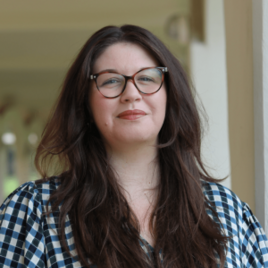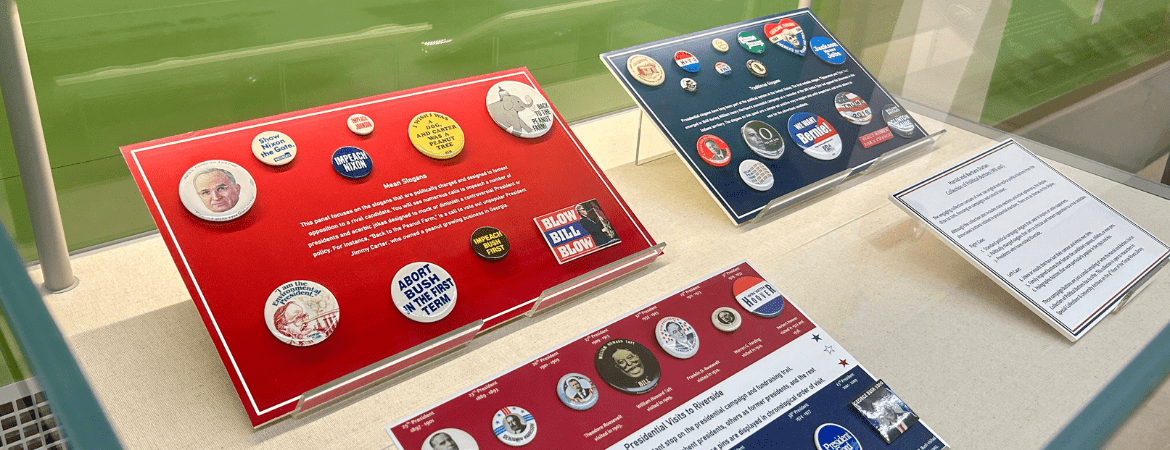Search
Search
Laura Bush 21st Century Librarian Program Grant
The Laura Bush 21st Century Librarian Program focuses on recruiting, educating, and retaining the next generation of library and archives professionals.
Under the Laura Buch 21st Century Librarian Program Grant, the UCR Library will participate in a three-year Joint Professional Development Institute (JPDI) with the University Libraries at Virginia Tech, the University of North Texas, the University of Colorado Boulder, and Los Alamos National Lab Research Library.
University Archives
Britt Foster
Britt’s key responsibility is providing strategic direction, planning, and implementation of UCR Library’s instructional program. Also a collaborative development of existing and new approaches to information literacy instruction, instructional design, pedagogic methods, and advanced online synchronous, asynchronous, and dual modality learning.
Director of Teaching and Learning

Institutional Lending
We provide loans or copies of UCR materials to academic, public, government, and nonprofit libraries.
Submitting Requests
OCLC is the preferred method for sending requests. If you do not have access to OCLC, complete an ALA Interlibrary Loan Form and send it to interlib@ucr.edu.
Newly Processed Collections: Summer 2019
Special Collections & University Archives employees are constantly working to process recently acquired collections and make those materials ready for use by students, faculty, and researchers.
Each quarter, we will provide a list of the UCR Library's newly processed archival and primary source collections. Check out this list to see if there are any items that fit your research area, or share with a friend!
Below you'll find brief descriptions and links to the finding aids or collection guides for each new collection. To use any of these materials, simply click the "Request Items" button at the top to submit a request, and log in with our Special Collections Request System. For more on conducting research in Special Collections, see this page.
SCUA is open to the public on weekdays from 11:00 am – 4:00 pm. Check here for closures or other changes to our regular hours.
For questions, email specialcollections@ucr.edu.
Newly Processed Collections: Summer 2019
Political Campaign Buttons

This exhibit is a selection of political buttons related to presidential elections from our Harold and Barbara Durian Collection of Political Buttons.
These campaign buttons are just a small sampling of what the Harold and Barbara Durian Collection of Political Buttons has to offer. The full collection consists of over 200 original and replica political buttons from the 1870s to 2016 and includes state elections and other ephemera—not just presidential buttons. The collection is open to researchers in Special Collections & University Archives on the 4th floor of the Tomás Rivera Library.
| Event | Political Campaign Buttons |
| Location | Tomás Rivera Library, 1st Floor, (left of the Library entrance) |
| Dates | Wednesday, October 2, 2024 - Tuesday, November 26, 2024 |
| Hours | Monday - Thursday: 7:30 a.m. - 12 a.m. NOTE: We are closed during UCR observed holidays. |
| Parking | Free Visitor Parking is available on Fridays, starting at 12:00 PM through 6:00 AM Monday morning in the unreserved spaces of the following parking lots/structures:
|
UC reaches open access agreement with Elsevier
After more than two years of negotiations, this morning the University of California announced a transformative open access agreement with Elsevier, the world’s largest academic publisher.
This successful outcome is the result of UC’s faculty, librarians and university leadership coming together to stand firm on our goals of making UC research freely available to all and transforming scholarly communication for the better.
The new four-year agreement will go into effect on April 1, 2021, restoring UC’s direct online access to Elsevier journals while accomplishing the university’s two goals for all publisher agreements:
(1) Enabling universal open access to all UC research; and
(2) Containing the excessively high costs associated with licensing journals.
These goals directly support UC’s responsibility as a steward of public funds and its mission as a public university to make its research freely available. The agreement with Elsevier will significantly increase the number of articles covered by UC’s open access agreements.
What the agreement means for the UC community
- Reading access: Effective April 1, UC will regain access to articles published in Elsevier journals the libraries subscribed to before, plus additional journals to which UC previously did not subscribe.
- Open access publishing in Elsevier journals: The agreement will also provide for open access publishing of UC research in more than 2,500 Elsevier journals from day one. The Cell Press and Lancet families of journals will be integrated midway through the four-year agreement; UC’s agreement is the first in the world to provide for open access publishing in the entire suite of these prestigious journals.
- Library support for open access publishing: All articles with a UC corresponding author will be open access by default, with the library automatically paying the first $1,000 of the open access fee (also known as an article publishing charge or APC). Authors will be asked to pay the remainder of the APC if they have research funds available to do so.
- Discounts on publishing: To lower those costs even further for authors, UC has negotiated a 15 percent discount on the APCs for most Elsevier journals; the discount is 10 percent for the Cell Press and Lancet families of journals.
- Full funding support for those who need it: To ensure that all authors have the opportunity to publish their work open access, the library will cover the full amount of the APC for those who do not have sufficient research funds for the author share. Authors may also opt out of open access publishing if they wish.
The economics of the deal
As with UC’s other recent open access agreements, the Elsevier agreement integrates library and author payments into a single, cost-controlled contract. This shared funding model enables the campus libraries to reallocate a portion of our journals budget to help subsidize authors’ APCs — assistance that makes it easier and more affordable for authors to choose to publish open access.
Even with library support, authors’ research funds continue to play a critical role. This funding model only works if authors who do have funds pay their share of the APC.
In the other open access agreements UC has implemented, we are already seeing a significant proportion of authors paying their share of the APC. If this promising trend continues, UC can blaze a path to full open access that is sustainable across ever more publishers.
Partnering with publishers of all types and sizes
Meanwhile, the university continues to forge partnerships with publishers of all types and sizes. In addition to Elsevier, UC also signed open access agreements with three more not-for-profit and society publishers this month — The Company of Biologists, The Royal Society and Canadian Science Publishing. These agreements are in addition to those secured previously with Springer Nature, Cambridge University Press, society publisher ACM, and native open access publishers PLOS and JMIR.
Ultimately, UC’s goal is to make it possible for all authors to publish their work open access in whatever journal they choose — providing broad public access to the fruits of UC’s research. This month, we have made a tremendous stride in that direction. We know that this has been a lengthy process and we thank you for your patience and support as we worked to reach this outcome.
If you have questions, please don’t hesitate to contact Tiffany Moxham, Associate University Librarian for Content and Discovery, at any time.
George Brown Papers Now Open for Research
On Thursday, November 17, 2016, UCR Library announced the opening of the George Brown Papers for scholarly research.
A private reception held on the first floor of Tomás Rivera Library honored Congressman George Brown’s life and work and recognized how his legacy will continue to serve future generations through this collection. Attendees included Brown’s widow, Marta Macias Brown, who had worked extensively with library employees to help make this collection available to the public.
“The wealth of materials in the papers will prove a fantastic resource for researchers interested in public policy, local history, the legislative process, and a number of economic, environmental, and social issues,” stated Collections Management Librarian Jessica Geiser. Geiser was first hired as a project archivist for the George Brown collection in September 2014. She led a team of students that documented their two-year long effort to organize and catalog this extensive assortment of primary source materials.
The collection includes over 1,000 boxes of professional and personal papers, photographs, audiovisual and digital materials, memorabilia, and more. Geiser and her team put great effort into ensuring easy access to the collection through the online finding aid. Resources on federal science and technology policy, environmental protection efforts including water and air pollution regulation, alternative fuel and energy development, land preservation and protection efforts, and climate change prevention are housed on the fourth floor of Rivera Library in Special Collections & University Archives. Materials are available for review in the reading room.
University Librarian Steven Mandeville-Gamble remarked, “George Brown was a great example of someone who could collaborate across party lines while working toward the greater good, which serves as a wonderful reminder of what is needed most during times of great change, like those we are currently experiencing.”
In many ways, Brown was a visionary whose contributions were ahead of his time. Brown was elected to the United States House of Representatives to represent the Los Angeles region from 1963 to 1971, and the Inland Empire from 1973 until his death in 1999. Noteworthy accomplishments during Brown’s 34-year tenure include the establishment of the Environmental Protection Agency (EPA), the passage of the Civil Rights Act of 1964, the Office of Science Technology Policy, scholarships for veterans, and Section 8 housing for low-income citizens.